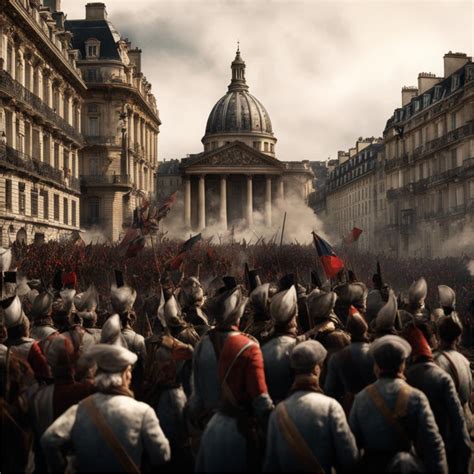Delve into the tumultuous era of the French Revolution and discover your own revolutionary fervor with this comprehensive test. Answer the following questions to assess your understanding of this pivotal historical event.

Revolutionary Ideals
- What were the key principles of the Declaration of the Rights of Man and of the Citizen?
- How did the concept of “Liberty, Equality, Fraternity” influence the course of the revolution?
- Discuss the role of the Enlightenment thinkers in shaping revolutionary ideology.
Leaders and Events
- Name the influential leaders who played key roles in the revolution, and describe their motivations.
- Explain the causes and significance of the Storming of the Bastille.
- Describe the rise and fall of the Reign of Terror, and its impact on French society.
Society and Politics
- What were the social and economic grievances that contributed to the outbreak of the revolution?
- Analyze the complex relationship between the monarchy and the revolutionary government.
- Discuss the role of women in the French Revolution and their demands for equality.
Legacy and Impact
- Explain the lasting impact of the French Revolution on political thought and government systems.
- Discuss the spread of revolutionary ideas across Europe and beyond.
- Assess the extent to which the goals of the revolution were achieved.
Answer Key
- Declaration of the Rights of Man and of the Citizen: Natural rights of man (life, liberty, property), popular sovereignty, separation of powers
- Liberty, Equality, Fraternity: Inspired revolutionary action, sought to create a society free from oppression and privilege
- Enlightenment Thinkers: Jean-Jacques Rousseau (social contract), Voltaire (freedom of thought), Montesquieu (separation of powers)
- Leaders and Motivations:
– Louis XVI: Weak and indecisive, sought to maintain absolute monarchy
– Maximilien Robespierre: Radical Jacobin, believed in the rule of virtue and terror
– Georges Danton: Dantonist, advocated for a more moderate approach - Storming of the Bastille (14 July 1789): Symbolic event that marked the beginning of the armed insurrection against the monarchy
- Reign of Terror (1793-1794): Period of widespread violence and execution, orchestrated by the Committee of Public Safety
- Social and Economic Grievances: High taxes, food shortages, peasant unrest, inequality between privileged and unprivileged classes
- Monarchy and Revolutionary Government: Conflict between the absolutist monarchy (Louis XVI) and the revolutionary assemblies (National Assembly, Convention)
- Women in the Revolution: Demanded political rights, including voting and holding office; played active roles in demonstrations and protests
- Legacy and Impact:
– Spread of republicanism and constitutionalism
– Ideals of liberty and equality inspired future revolutions
– Laid the foundation for modern democracy - Spread of Revolutionary Ideas: Inspired revolutions in other European countries (e.g., Netherlands, Belgium, Italy) and Latin America
- Achievement of Goals: Some goals (e.g., liberty, equality) were partially achieved, but others (e.g., fraternity) remained elusive
Your Revolutionary Score
Based on your answers, you can determine your level of revolutionary fervor:
- 0-5 Correct: You have a modest understanding of the French Revolution. Consider brushing up on your historical knowledge.
- 6-9 Correct: Your knowledge is solid. You’ve grasped the key events and ideas of the revolution.
- 10-12 Correct: You are a true revolutionary scholar! Your understanding is comprehensive and nuanced.
Tips and Tricks for Tackling the Test
- Study the Key Events and Figures: Familiarize yourself with the main events and influential figures of the revolution.
- Understand the Ideals: Comprehend the principles that drove the revolution, such as liberty, equality, and fraternity.
- Analyze the Causes and Impacts: Explore the social, political, and economic factors that led to the revolution and its lasting consequences.
- Consider Different Perspectives: Examine the revolution from various perspectives, including the monarchy, the revolutionaries, and the common people.
- Practice with Mock Questions: Take practice tests or review past exam questions to hone your skills.
